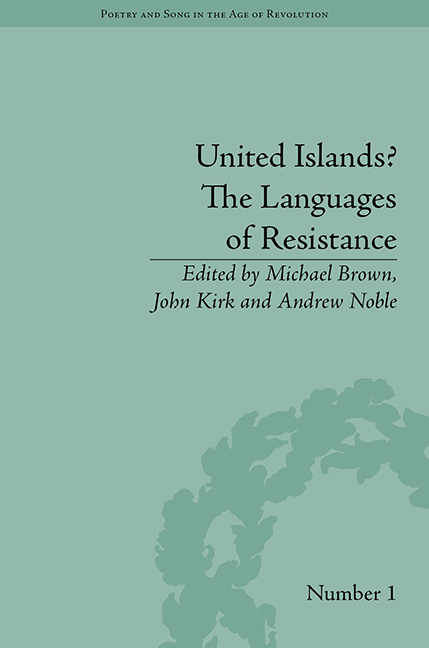Book contents
- Frontmatter
- CONTENTS
- Acknowledgements
- List of Figures and Tables
- List of Contributors
- Introduction: The Languages of Resistance: National Particularities, Universal Aspirations
- 1 Reading the English Political Songs of the 1790s
- 2 Why should the Landlords have the Best Songs? Thomas Spence and the Subversion of Popular Song
- 3 ‘Bard of Liberty’: Iolo Morganwg, Wales and Radical Song
- 4 Canonicity and Radical Evangelicalism: The Case of Thomas Kelly
- 5 Charlotte Brooke's Reliques of Irish Poetry: Eighteenth-Century ‘Irish Song’ and the Politics of Remediation
- 6 Homology, Analogy and the Perception of Irish Radicalism
- 7 Lost Manuscripts and Reactionary Rustling: Was there a Radical Scottish Gaelic Poetry between 1770 and 1820?
- 8 Virile Vernaculars: Radical Sexuality as Social Subversion in Irish Chapbook Verse, 1780–1820
- 9 Thomas Moore and the Problem of Colonial Masculinity in Irish Romanticism
- 10 Radical Politics and Dialect in the British Archipelago
- 11 ‘Theaw Kon Ekspect No Mooar Eawt ov a Pig thin a Grunt’: Searching for the Radical Dialect Voice in Industrial Lancashire and the West Riding, 1798–1819
- Afterword: The Languages of Resistance
- Notes
- Works Cited
- Index
Introduction: The Languages of Resistance: National Particularities, Universal Aspirations
- Frontmatter
- CONTENTS
- Acknowledgements
- List of Figures and Tables
- List of Contributors
- Introduction: The Languages of Resistance: National Particularities, Universal Aspirations
- 1 Reading the English Political Songs of the 1790s
- 2 Why should the Landlords have the Best Songs? Thomas Spence and the Subversion of Popular Song
- 3 ‘Bard of Liberty’: Iolo Morganwg, Wales and Radical Song
- 4 Canonicity and Radical Evangelicalism: The Case of Thomas Kelly
- 5 Charlotte Brooke's Reliques of Irish Poetry: Eighteenth-Century ‘Irish Song’ and the Politics of Remediation
- 6 Homology, Analogy and the Perception of Irish Radicalism
- 7 Lost Manuscripts and Reactionary Rustling: Was there a Radical Scottish Gaelic Poetry between 1770 and 1820?
- 8 Virile Vernaculars: Radical Sexuality as Social Subversion in Irish Chapbook Verse, 1780–1820
- 9 Thomas Moore and the Problem of Colonial Masculinity in Irish Romanticism
- 10 Radical Politics and Dialect in the British Archipelago
- 11 ‘Theaw Kon Ekspect No Mooar Eawt ov a Pig thin a Grunt’: Searching for the Radical Dialect Voice in Industrial Lancashire and the West Riding, 1798–1819
- Afterword: The Languages of Resistance
- Notes
- Works Cited
- Index
Summary
Poetical work, Aristotle said, is more philosophical than history. If this is so then it is also more ‘historical’ than history, as Nietzsche argued, because the ‘history’ that poems touch and re-present encompasses a far greater scale of possible, and therefore real, human times and events than the most careful and scholarly historical text.
Jerome McGannIn writing this introduction to these two volumes of essays derived from two symposia at Queen's University Belfast on United Islands? Multilingual Radical Poetry and Folk-Song in Britain and Ireland 1770–1820, I am perhaps less, but certainly differently, apprehensive than when with my fellow editors we were formulating an AHRC Research Networking application which required for its success high quality, scholarly, interdisciplinary participation from England, Scotland, Wales, Ulster and the Irish Republic and, not least, North America. If we asked them, would they come? The response was, in fact, so positive that, some participants returning, we had to hold a second symposium. Fearing a famine, we actually had a feast.
I will later return as to why there was such a convergence of geographically diverse talents on Queen's University. For the moment my partly-retrospective belief is that Belfast itself, the ghostly historical political and sectarian pressures of the 1790s wholly precursive of the city's still severe contemporary divisions, significantly brought home to the participants, as perhaps no other British city could, the relevance of the 1790s to our present condition. Despite Wordsworth's insistence on the pastoral imagination, song-filled British cities were the key centres not only of conflicting political activity but literary creativity in this period. Belfast, as Ireland, was the site of actual violence. It was here that the American influenced Volunteers were formed initiating a trail of violence that was to lead to Wexford and 30,000 Irish dead in 1798.
- Type
- Chapter
- Information
- United Islands?The Languages of Resistance, pp. 1 - 34Publisher: Pickering & ChattoFirst published in: 2014



